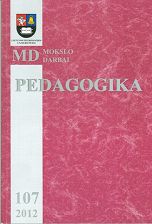Akademinės laisvės raiška visuomenėje ir akademinėje bendruomenėje
Expression Of Academic Freedom In Society And Academic Community
Author(s): Agnė Juškevičienė, Rasa NedzinskaitėSubject(s): Education
Published by: Vytauto Didžiojo Universitetas
Keywords: Academic Freedom; Academic Society; Autonomy; Globalization
Summary/Abstract: The aim of the present article is to discuss and disclose the conception of academic freedom, its expression in various universities around the world. The problem analysed is what is the relation of academic freedom with society and inside the academic community addressing the challenges of the 21st century. The aim of the article is to disclose the relationship of academic freedom, as the basic value of higher education and society as well as academic community based on the experience of other countries around the world. The work is based on the following conceptual approaches: conception of liberal higher education; conception of democratic higher education. The research methods used: theoretical – analysis of academic literature, international and Lithuanian documents, interpretation, evaluation and generalisation with the aim of disclosing the characteristic features of academic freedom, its expression based on the experience of other countries around the world. It should be stressed that there is no established appropriate and comprehensive definition of academic freedom, that is why in the present article, based on the scholarly observations, academic freedom is considered to be the foundation of activity of the university, part of its mission, paving the way for its professors, scholars, students to advance science and constructively criticise society. It should be emphasized that there is a need for institutional autonomy in order to ensure freedom of academic community. The present article, based on the research by T. Karran (2007), aims to disclose the expression of academic freedom in the countries of European Union between academic community and society. On the basis of the EU documents there were established five parameters that are important for academic freedom: the country’s Constitution; documents regulating higher education; legal management of universities; appointment of the rector; academic term. Lithuanian circumstances are highlighted through the analysis of documents regulating the country’s higher education system and internal university documents. There is also emphasized negative experience in the sphere of the Lithuanian higher education dating from 2011, by contrasting the legal documents regulating the activity of the university with arbitrariness that discloses a weak link in discussion between academic community and society as a whole. On the basis of the analysis of academic literature and scholarly research there are questions raised for discussion It is asked whether academic community and society can resist the commercialisation of higher education, whether they can safeguard and nurture the value of higher education. One can only hope that with the world becoming more and more pragmatic, society will still consider university as an institution fostering culture and not only as a service providing institution, or as a participant or means in economic relations.
Journal: Pedagogika
- Issue Year: 2012
- Issue No: 107
- Page Range: 42-52
- Page Count: 11
- Language: Lithuanian

